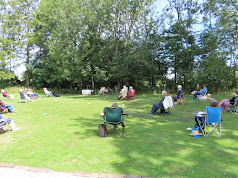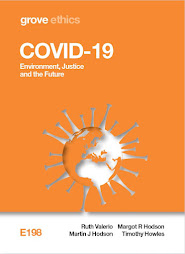Martin and Margot Hodson's Christmas Letter for 2020
Dear All,
Everyone in the world will say that 2020 was a different year to normal, and we are no exception! We began the year extremely busy with numerous in-person speaking events (remember those?). The highlight was Martin’s weekend trip to Guernsey in early March supporting our friends from A Rocha UK with two speaking events on Saturday and three sermons on Sunday! But then quite suddenly everything changed, and words like coronavirus, lockdown, and social distancing dominated our lives. We have been very blessed by living in such a wonderful part of the world, The Cotswolds, and we can just walk out of our Vicarage into the amazing countryside. We also have a massive garden, and actually managed to grow quite a lot of food this year, a first for us.
Shill Valley and Broadshire Benefice
Margot’s parish work rapidly switched from quite formal services to online film making. And when we were allowed to we had some great open-air services at Alvescot where they have a large area of church land under a huge old oak tree next to a car park- a perfect setting. Towards the end of the year there have been tentative, very careful indoor services once more. Perhaps best of all though has been the development of a fellowship group from a Lent Course, and that now operates on Zoom.
Writing!
But with travels much reduced writing continued or even accelerated. Martin published three academic journal articles in 2020 and completed a two and a half year project as lead editor for “Frontiers in Phytolith Research”. That was a major job!
Not long into the pandemic the Grove Ethics committee decided that they needed a COVID booklet. They needed it quickly- just three weeks. Working with our friends, Ruth Valerio and Tim Howles we made it with a day to spare, and “Covid-19: Environment, Justice and the Future” was published in July.
We published our “A Christian Guide to Environmental Issues” back in 2015, and it sold fairly well, but was getting a little dated. So we approached our publishers, BRF, about a second edition, and they agreed. It needed a lot of work to update it, but the 2nd edition should be published in April next year. Finally, at the same time, BRF will publish “Green Reflections”, a collection of the Bible reflections we have written over the last few years, and some new ones.
Holidays? Well, we were very grateful to fit in one at a cottage in mid-Wales in October, in between various lockdowns. We did lots of walking, saw friends in a socially distanced way, and even watched a few films!
It has, of course,
been a very sad year for many people, and we have shared in that sadness. In
April the President and founder of JRI, Sir John
Houghton, sadly died of COVID. He was a truly great man and we were
fortunate to have known him. We know of many other cases, and the pandemic is
very far from over. Let us hope that the vaccines really click in next year and
that 2021 can be a big improvement on 2020.
Have a good
Christmas and stay safe everyone!
Martin and Margot







